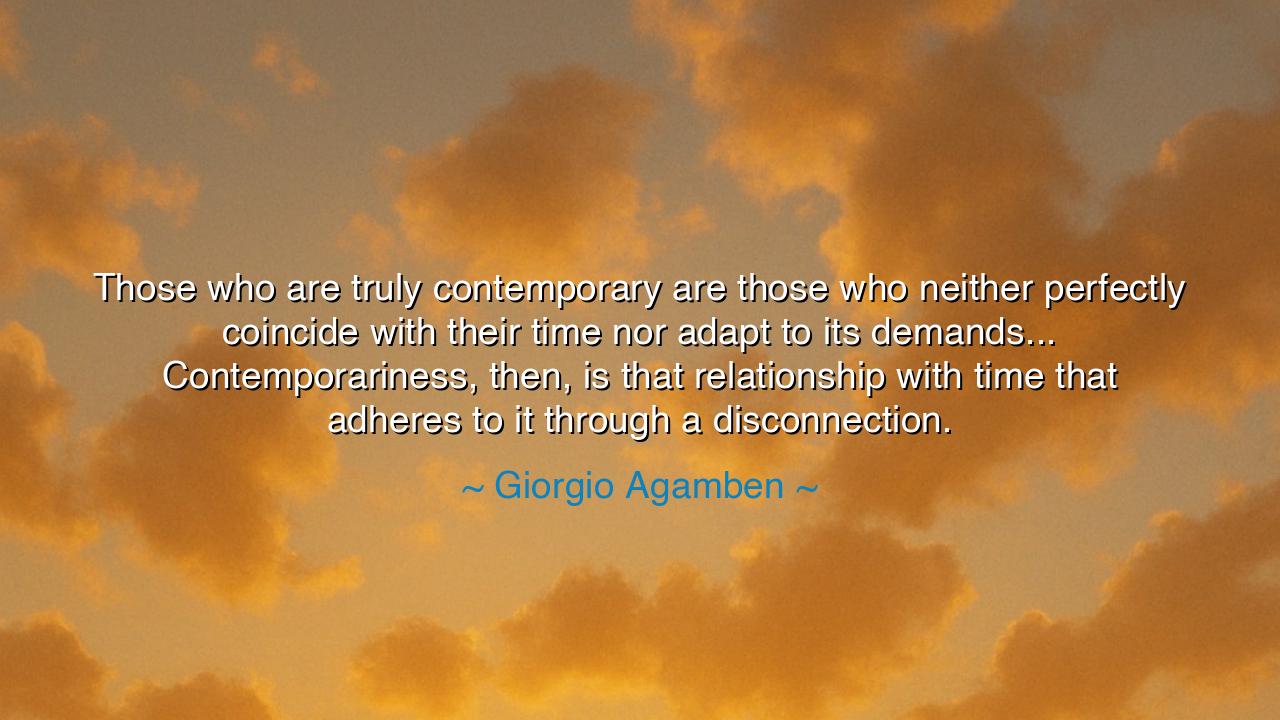
Those who are truly contemporary are those who neither perfectly
Those who are truly contemporary are those who neither perfectly coincide with their time nor adapt to its demands... Contemporariness, then, is that relationship with time that adheres to it through a disconnection.






The words of Giorgio Agamben—“Those who are truly contemporary are those who neither perfectly coincide with their time nor adapt to its demands... Contemporariness, then, is that relationship with time that adheres to it through a disconnection”—speak with the mysterious wisdom of the seer. They remind us that to truly belong to an age is not to mirror it, but to stand slightly apart, seeing both its light and its shadows, and thus giving voice to truths that the age itself cannot yet fully grasp.
The ancients knew this paradox well. The prophets, the philosophers, the poets—these were never those who blended seamlessly into the chorus of their era. Rather, they were the ones who stood at the margins, who refused to bend to the demands of convention, and in that refusal revealed a deeper vision. To be contemporary, then, is not mere conformity, but an act of courage: to be within one’s age and yet not consumed by it.
Agamben’s teaching tells us that true relationship with time is born not of surrender, but of tension. The one who coincides too perfectly with their age is invisible, swallowed by its tide. The one who withdraws entirely is irrelevant, cut off from its pulse. But the one who clings to time by way of disconnection, who both belongs and does not belong, becomes a mirror in which the present can finally see itself.
This truth is powerful, for it defines the heroism of the thinker, the artist, the visionary. They are always strangers in their own land, at once rooted and estranged. Their eyes pierce beyond the veil of their moment, and in their refusal to adapt blindly, they open the door to transformation. Such souls often endure solitude, but their solitude becomes the seedbed of renewal for generations to come.
So let this teaching endure: to be truly contemporary is to live in the paradox of belonging and estrangement, of presence and distance. Do not lose yourself in the noise of your age, nor flee entirely from its voice. Stand at its edge, connected yet apart, and in that space you will see clearly, speak bravely, and leave behind wisdom that outlives the fleeting hour.






NPNguyen Phong
This quote makes me question the very nature of time and how we interact with it. Agamben’s idea of contemporariness seems to suggest that true engagement with time requires some form of detachment. How can we navigate living in the present while also maintaining a sense of individuality or autonomy? Is it possible to be truly ‘in sync’ with the present without giving up some part of ourselves?
ANTran Anh Ngoc
Agamben’s concept of contemporariness feels almost paradoxical. To be ‘truly contemporary’ means not fully fitting into your time but still engaging with it, though in a disconnected way. It makes me wonder if being disconnected is a form of resistance, or if it's just a natural part of being introspective. How do you maintain this balance between being part of the world and staying true to your own sense of self without fully adapting to its demands?
JKJisoo Kim
This idea of disconnection really resonates with me. It’s almost as if being fully ‘in the moment’ is not the ideal way to engage with time. Instead, it’s through stepping back or resisting the current that one gains true contemporariness. But does that mean people who embrace the present moment without questioning it are somehow less valid in their perspective? Can we be part of our time without losing our individuality?
HNHoai Nguyen
I find Agamben’s perspective on contemporariness fascinating. He’s almost suggesting that being ‘too in tune’ with the present makes you lose your edge. Is it possible to truly be contemporary without some form of resistance or disconnection from the prevailing culture? What does it mean for someone who feels completely immersed in the current moment—does that mean they are not contemporary, or is that a different kind of engagement?
Vvrgvfdh
This quote really challenges the idea of what it means to be contemporary. Agamben seems to suggest that true contemporariness involves a tension with the present, almost like being out of sync with it. But doesn’t that make it harder to be effective in today’s world? Can you truly contribute meaningfully if you're not aligned with the demands of your time? Or is it the disconnection itself that brings a unique perspective?